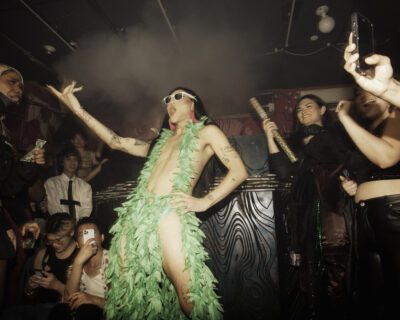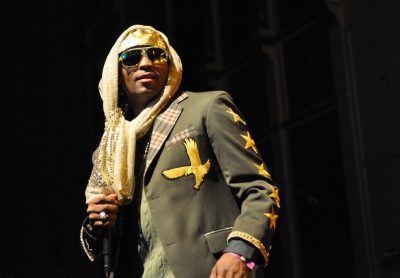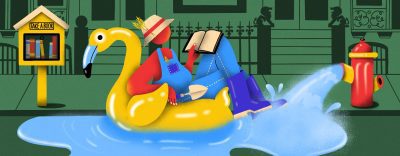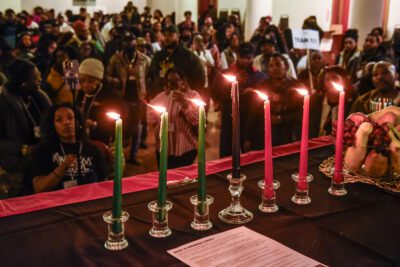Will Butler (far right) and Sister Squares
Arcade Fire’s Will Butler went solo and picked up some sisters along the way
Will Butler + Sister Squares' debut album drops on Friday, and the band will play Elsewhere on Saturday night
“Did you notice how batshit fucking crazy the city was the first few days of school?” musician Will Butler asks, midway through our interview. He wants to know if I really understand the jarring experience of starting a new school year in Brooklyn.
“Were you aware of that? Were you like, ‘What the fuck is happening?’ It’s a different energy.”
The Butler family lives near Green-Wood Cemetery, and this year, his oldest kid started middle school. “I don’t naturally like waking up early,” he says.
When you talk with Will Butler, 40, you’re caught up in his mixture of excitement for new projects, frankness about leaving his band Arcade Fire at the end of 2021, and lots of self-depreciation.
Butler’s down-to-earth response to his artistic choices makes sense when you realize what he walked away from: the Grammy-winning Arcade Fire is essentially a family band, founded by his brother Win Butler. Will was brought into the fold in 2003 when former band member Brendan Reed quit on stage during a show.
After spending his entire adult life in Arcade Fire, the decision to leave after recording the band’s 2022 album “We” felt “very natural” to him, he says.
“I was 39 and still have a little pep in my step,” says Butler. “I didn’t know what I was gonna do, but that’s probably what led to Sister Squares.”
His new band Sister Squares includes members Sara Dobbs, Julie Shore, Jenny Shore and Miles Francis. They’ve toured with him since his first solo album, 2015’s “Policy.” And after leaving Arcade Fire, he proposed they formalize things by creating Will Butler + Sister Squares.
What could’ve been Butler’s fourth solo album became the band’s first self-titled debut, out on September 22 from Merge Records. He calls the album “glacially slow with a fucked up colorscape, but with dancey drums.”
Brooklyn Magazine spoke with Will Butler about life after Arcade Fire. He explains that Sister Squares, like his last group, is also made up of family members and friends. Butler talks about recording part of the album at Figure 8 Recordings off Grand Army Plaza and his favorite sweets in the area. He also declares his love for Elsewhere’s Zone One stage, where Will Butler + Sister Squares debut their new album on Saturday night.
Excerpts:
What was the experience of making last year’s Arcade Fire album “We” but leaving the band before it was released?
Recording “We” was great. You know, I worked with [producer] Nigel Godrich on that record. On a personal level, it was so rewarding to my teenage self to hang out with Nigel Godrich and like making synth sounds and giggling like a schoolgirl. On a personal level, leaving after recording it made sense. It was like, “The record is done, and now I will walk away.” It felt like a very natural time to close the door. I mean, it’s a crazy thing. My brother’s in the band, and they’re my family. It’s the only thing I’ve done in my adult life.
Tell me about the members of Sister Squares.
One of the members is my wife Jenny Shore, and I met her in 2001 in Chicago. She was a choreographer and a dancer. We started dating and produced little dance shows together. She’s kind of new to the band, but her sister Julie I asked to be in my touring band in 2015. Then their friend Sara [Dobbs] was a Broadway actress and played Anybodys in 2009’s “West Side Story.” But it’s such a fucking miserable life. Like, it’s such a horrible thing being an actress. She didn’t want to do it anymore, so I asked her to join the band. I met Miles [Francis] on tour with Arcade Fire. He was drumming for Antibalas, and we just hit it off.
They’ve been your backing band since 2015, so how did you all become Will Butler + Sister Squares?
The members of Sister Squares all played together on the Will Butler Policy Tour, and we’ve become close since. It started with Miles producing this record with me, but I didn’t know if it was going to be a Will Butler album. Eventually, we decided to make a real band record and dive in. Naming it actually changed the thing. We became Sister Squares, and suddenly everyone had agency. When your name’s on it, you’re on your toes in a different way. It’s like your reputation’s on the line. They’re a unit, and naming it has increased their creative feedback, which is really fun.
How have they shaped the band’s sound?
Miles and Julie in particular are much more plugged into pop music. Plugged in from NSYNC to Rosalía, and I hear that influence a lot on the record. There’s a lot of drum mixes, there’s a lot of sonics that feel a lot more three-dimensional. They’re really pushing things in different directions.
I discovered Miles’ album “Good Man” when prepping for our conversation and was floored by it. What’s your collaboration like?
It’s very pure. We started the record at Synthia, Miles’ basement studio. I played bass and he played drums and the stuff we made that day was the beginning of “Stop Talking.” It was really fun and enjoyable and rewarding. Sometimes we approached it from chords and notes, and sometimes we approached it from textures. Sometimes it started with Miles making a drum machine beat. Sometimes it happened with us playing in the room. Sometimes it was Miles giving me a baseline. It was a very pure workshop energy, a very childhood creative arts class feel. Sometimes you can’t shift gears in a relationship, but it was remarkably natural for us. It didn’t even feel like a change. This is just our friendship, and now we’re making music together.
You also recorded at Figure 8 Recordings off Grand Army Plaza, and I’m curious if you have some favorite spots in the area.
I’m a big fan of The Social and Ample Hills. I believe in them [Laughs.] I know it can be controversial and their ice cream’s too sweet for some people, but I love The Social. Me and Jenny live in Kensington, so it was just nice to be in a different spot in Brooklyn when we were recording. And Lincoln Station has a good rotisserie chicken!
Was the video for “Long Grass” shot on an iPhone? It’s perfectly shot for phone viewing.
My friend Adrienne Anderson and I shot it mostly on an old Canon 60D, and we just turned it sideways [Laughs.] I’m not on TikTok, but I use my phone to watch a lot of things, and it’s a much richer experience when it’s the full screen and you don’t have to change your tilt settings or whatever. So I was like, “Let’s just make how you look at the phone when I’m like lying in bed and I should be sleeping.” It was shot at Spoke the Hub the last month they were in Gowanus, before they moved to Union Street.
I noticed some nice Fosse movies in the video’s choreography.
[Laughs.] Sarah sent around the clip of a Fosse frug and she was like “We need to do a frug kind of thing.”
Your music is very visual to me. What influences did you draw on for the album?
My whole life I’ve aspired to cinematic music in that sense. I think the music wellspring of it is probably the Björk records “Debut,” “Post” and “Homogenic.” That one is so frickin’ cinematic and sculptural. I watch a lot of movies. I watch a lot of Tarkovsky. He has a book about filmmaking called “Sculpting in Time” and I felt that’s what we’re doing on this record. We’re sculpting in time. [Laughs.] I like “Stalker,” where it’s just like glacially slow and beautiful and has a fucked up colorscape.
You recently said music videos aren’t as interesting now as when you were a teenager, and I wonder if you think they’ve changed or have you?
I think they occupy a different cultural space than in my youth, which is fine. When I was a kid, they were putting out Directors Label with Michel Gondry and Spike Jonez box sets. They were music videos both for MTV and as art that you would watch on a DVD player. They were videos with budgets of millions of dollars, and now nothing has a budget of millions of dollars, not even outside of music videos.
What else are you working on outside of the band?
I’m doing theater stuff now, and people are like, “What brings you to the theater?” And I’m like, “Well, I live in New York, and it’s like one of the few places you can really dig in and do something exciting in the theater.” I made music for a theater piece right now called “Stereophonic” that opens this fall at Playwrights Horizons. With SAG on strike, the actors in it are very focused on the theater. It’s interesting to be in the theater and have them be like, “Well, this is the only thing going, so let’s dig in.”
Tell me more about that.
Previews start in October and it opens at the end of October. It’s set in 1976 about a band recording in the studio. I’m doing the music for it, and I think there’s one complete song in it. They’ll play 30 seconds, and then a character will go, “Why the fuck are you playing the drums that way?” A lot of being in a band is falling apart and trying songs fast and slow, or trying it backwards. It’s written by this playwright, David Adjmi, who did a brilliant job, where it’s both extremely particular about being in the studio, and it’s also about making all art and it’s also about being a human and trying to have a life.
Elsewhere’s Zone One is a special stage dedicated to local artists and emerging acts. Why are you debuting the album there on Saturday night?
I really like Elsewhere. The last show we played in Brooklyn was at a Public Records in Gowanus, and in some ways, I wanted to do something in South Brooklyn, but Bushwick feels good also. Feels like people are out there on a Saturday night, so it feels appropriate.
You might also like 


























